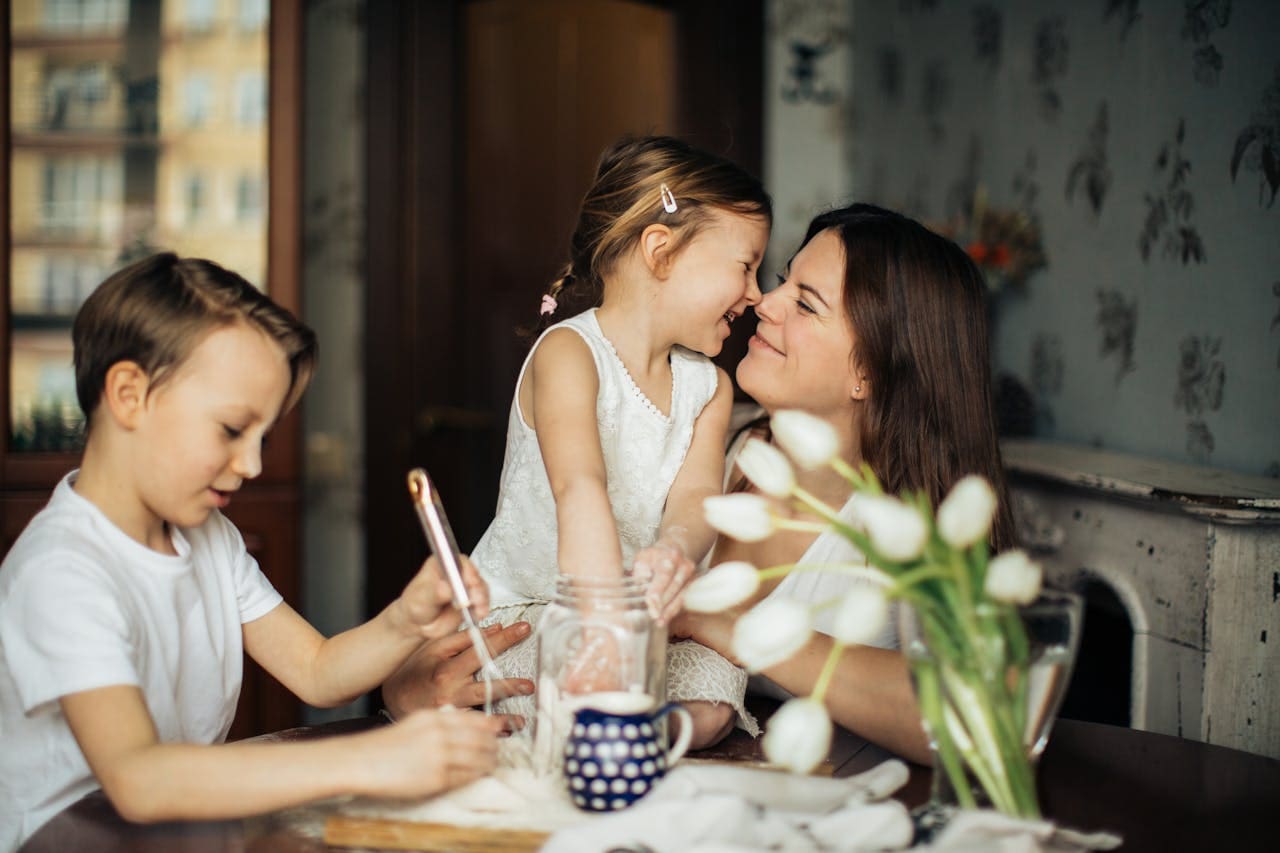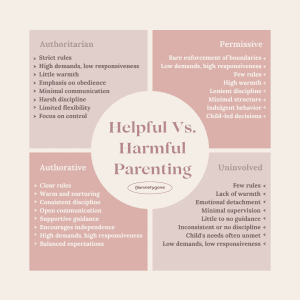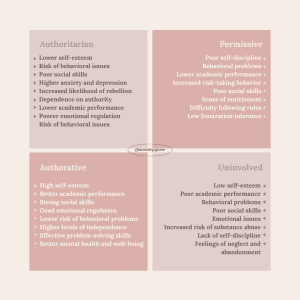Full Disclosure: Clicking on these links could mean a tiny commission for me, at no extra cost to you.
Exploring different types of parenting and choosing the best parenting style for your child implies consciousness and understanding: of yourself and your child. Deciding what kind of relationship you would like and the behaviours you want to cultivate in your child could help you make more informed decisions about how you parent. Even though there will be times when your patience and boundaries are tested, it’s important to keep the end goal in sight: raising healthy, happy, independent kids who can function effectively as adults. And sometimes that requires us to be agile enough to know when a change in stance will benefit the next generation we’re raising.
What are Parenting Styles?
Parenting styles refer to the various strategies and approaches that parents use to raise their children. These types of parenting encompass the attitudes, behaviors, and practices that parents use to interact with their children, manage their behavior, and guide their development.
In the 1960s, a psychologist called Diana Baumrind identified three major types of parenting styles: authoritarian, permissive, and authoritative. A fourth type (uninvolved or neglectful) was added later.
These four types of parenting have been heavily studied and are now associated with different outcomes.
- Authoritative Parenting: This style is characterized by high responsiveness and high demands. Authoritative parents set clear expectations and rules but are also supportive and responsive to their children’s needs. They encourage independence while maintaining structure and guidance.
- Authoritarian Parenting: Authoritarian parents are highly demanding but not very responsive. They enforce strict rules and expect obedience, often with little room for discussion or flexibility. This style emphasizes discipline and control.
- Permissive Parenting: Permissive parents are highly responsive but have few demands or expectations. They are lenient and indulgent, allowing their children a lot of freedom. While they are nurturing and communicative, they often struggle to set and enforce boundaries.
- Uninvolved Parenting: Uninvolved parents are low in both responsiveness and demands. They provide little guidance, nurturing, or attention, often due to their own issues or lack of interest in parenting. This style can lead to a lack of structure and support for the child.
Why Does Your Parenting Style Matter?
An effective parenting approach sets the foundation for your child’s success: socially, academically, emotionally, and inter-personally 1. Your approach to discipline will have an enduring effect on the rest of your child’s life. While most of us can identify with one or two types of parenting, adapting your approach to the situation can keep you in touch with your child.
Key Benefits of Choosing The Right Types of Parenting
Here are some key reasons to prioritize choosing healthy types of parenting styles:
- Emotional Development: Your parenting style influences your child’s emotional well-being and self-esteem. Supportive and responsive parenting can help children feel valued and secure.
- Behavioral Outcomes: Different parenting styles can lead to different behavioral outcomes in children 2. For example, authoritative parenting is often associated with well-adjusted and socially competent children.
- Academic Success: Children raised with consistent support and clear expectations tend to perform better academically. Authoritative parenting, in particular, has been linked to higher academic achievement.
- Social Skills: The way you parent can affect your child’s ability to interact with others. Styles that encourage open communication and empathy can lead to better social skills and relationships.
- Independence and Responsibility: Parenting styles that balance guidance with independence help children develop a sense of responsibility and self-reliance 3. Authoritative parents often excel in fostering these qualities.
- Coping Mechanisms: Children learn how to cope with stress and challenges based on their parents’ behavior. Supportive parenting helps children develop healthy coping mechanisms.
- Mental Health: Parenting styles can impact a child’s mental health. Authoritative and supportive parenting is generally linked to lower levels of anxiety and depression in children.
- Long-term Effects: The impact of parenting styles extends into adulthood, influencing a child’s future relationships, career success, and overall life satisfaction.
By understanding and adapting your parenting style, you can create a nurturing environment that promotes your child’s overall well-being and success.
advertisement
Is Your Child Struggling?
Teen Counseling offers expert online therapy to help them navigate their challenges and thrive. Connect with a licensed therapist today and give your teen the support they need.
Don’t wait – help is just a click away! .
Authoritarian Parenting
Authoritarian parenting is a style characterized by high demands and low responsiveness. Parents who adopt this style enforce strict rules and expectations, often with little room for negotiation or input from the child. The primary focus is on obedience, discipline, and control, with an emphasis on maintaining order and authority.
Here are some key features of authoritarian types of parenting:
Key Features of Authoritarian Parenting
- High Expectations: Authoritarian parents have very high standards for their children’s behavior and often expect unquestioned obedience.
- Strict Rules: These parents enforce rigid rules and guidelines that must be followed without exception. Failure to comply typically results in punishment.
- Little Warmth: Authoritarian parents are less likely to show warmth and affection. Their interactions with their children are more directive and less nurturing.
- Punitive Discipline: Discipline in authoritarian households is often harsh and punitive. Parents may use corporal punishment or other strict consequences to enforce rules.
- Low Responsiveness: There is little room for the child’s voice in decision-making. Authoritarian parents are less responsive to their children’s emotional needs and concerns.
- Control: Authoritarian parents seek to control their children’s behavior and decisions to a great extent, often leaving little room for independence or autonomy.
Effects of Authoritarian Parenting
- Compliance and Obedience: Children raised with authoritarian parenting often learn to comply with rules and authority figures but may do so out of fear rather than understanding.
- Lower Self-Esteem: These children often struggle with self-esteem issues because they do not have the opportunity to develop a strong sense of self-worth and independence.
- Social Challenges: Authoritarian parenting can lead to social difficulties, as children may struggle with communication, empathy, and forming healthy relationships 4
- Increased Anxiety and Depression: The pressure to meet high standards and the fear of punishment can contribute to higher levels of anxiety and depression.
- Rebellion: Some children may respond to authoritarian parenting by becoming rebellious and defiant, particularly during adolescence 1
When Authoritarian Parenting can be Effective
Children who crave structure and rigidity in their routines, like Autistic children, may respond well to this style. Expectations are clear, consequences are explicit and everyone knows where they stand. However, punitive measures tend not to work on neurodiverse children.
Am I an Authoritarian Parent?
Authoritarian parents often raise their children to obey without asking questions. The authoritarian parent is most likely to respond to a child’s “why?” question with “because I said so!”
If you
- Don’t feel the need to explain or give reasons for your decisions but expect to be listened to
- Think children should be seen and not heard
- Have high academic and social expectations of your child
- Are quick to resort to punishment to elicit good behaviour
… you might be an authoritarian parent.
If your type of parenting leans towards authoritarian parenting, balance the austerity with warmth and affection. Pick your moments carefully and create times when your child can make his/her own decisions and experience a different side to you.
Permissive Parenting
Permissive parenting exists on the completely opposite side of the spectrum, and is characterized by high responsiveness and low demands.Parents who adopt this style are very lenient and indulgent, often acting more like friends than authority figures. They provide a lot of warmth and nurturing but set few rules and boundaries. The overriding belief of permissive parenting is, that with enough love and liberty, children will adapt their behaviour without being dictated to.
Here are some key features of permissive types of parenting:
Key Features of Permissive Parenting
- High Responsiveness: Permissive parents are very attentive and responsive to their children’s needs and desires, offering a lot of warmth and affection.
- Low Demands: These parents have few expectations or requirements for their children’s behavior. They are lenient and rarely enforce rules or discipline.
- Indulgence: Permissive parents often indulge their children’s wishes, providing them with considerable freedom to do as they please.
- Nontraditional Roles: They tend to avoid taking on the traditional parental role of authority figure, preferring to act more like a friend or peer.
- Lack of Structure: There is often a lack of routine and consistency in the household, as permissive parents do not impose regular schedules or rules.
- Minimal Discipline: When rules are broken, permissive parents are likely to use minimal or inconsistent discipline, opting instead to overlook or excuse the behavior.
Effects of Permissive Parenting
- Poor Self-Regulation: Children raised with permissive parenting may struggle with self-discipline and self-control, as they are not accustomed to boundaries and rules.
- Behavioral Issues: These children are more likely to exhibit behavioral problems, such as acting out or defying authority, due to the lack of consistent discipline 5.
- Lower Academic Achievement: Without structure and high expectations, children may have difficulty focusing on schoolwork and achieving academic success.
- Risk-Taking Behavior: Permissive parenting can lead to higher instances of risk-taking behavior, as children are not accustomed to the consequences of their actions 3.
- Poor Social Skills: Children may struggle with social interactions and understanding boundaries, leading to difficulties in forming healthy relationships.
- Entitlement: The indulgent nature of permissive parenting can result in children developing a sense of entitlement, expecting to get what they want without effort.
When Permissive Parenting can be Effective
If you the only types of parenting you use are only permissive when parenting your child, this style may not be effective. If you have a gifted or mature child, integrating some characteristics of permissive parenting can be beneficial. Gifted children thrive when they have boundaries and have the space and freedom for self-expression. They may also be sensitive and will need a nurturing environment.
Am I a Permissive Parent?
Permissive parenting is characterized by high levels of warmth and affection but low levels of structure and discipline. While this style creates a nurturing and loving environment, it often leads to issues with self-regulation, behavior, and academic performance in children. Balancing warmth with appropriate boundaries and expectations is key to promoting healthy development.
If you
- Set a few loose rules but do not enforce them
- Do not believe in enforcing consequences for actions or behaviours
- Correlate discipline with negative outcomes
- Believe your children will adapt to the world around them with minimal interference from you
… you might be a permissive parent.
Authoritative Parenting
Authoritative parenting is a balanced and effective parenting style characterized by high responsiveness and high demands. Parents who adopt this style set clear expectations and guidelines for their children but also provide a supportive and nurturing environment. They encourage independence while maintaining control and consistency.
Here are some key features of authoritative types of parenting:
Key Features of Authoritative Parenting
- High Responsiveness: Authoritative parents are highly responsive to their children’s emotional needs, showing warmth, love, and support.
- High Demands: These parents have high expectations for their children’s behavior and performance but also provide the resources and support needed to meet those expectations.
- Clear Expectations: They set clear, consistent rules and guidelines, explaining and discussing them with the children to help them understand the reasoning behind the rules.
- Open Communication: Authoritative parents encourage open dialogue with their children, listening to their opinions and allowing them to express themselves.
- Supportive Discipline: Discipline is fair and consistent but also supportive. Authoritative parents use positive reinforcement and reasoning rather than harsh punishment.
- Encouragement of Independence: They encourage their children to be independent and self-reliant while providing guidance and support when needed.
Effects of Authoritative Parenting
- High Self-Esteem: Children raised with authoritative parenting tend to have higher self-esteem, feeling valued and supported by their parents 5.
- Better Academic Performance: These children often perform better academically due to the high expectations and supportive environment.
- Strong Social Skills: The open communication and nurturing environment help children develop strong social skills and positive relationships 4
- Good Emotional Regulation: Children learn to manage their emotions effectively, thanks to the supportive and consistent parenting they receive.
- Lower Risk of Behavioral Problems: Authoritative parenting reduces behavioral problems because children understand and respect the established boundaries.
- Higher Levels of Independence: The balance of support and autonomy fosters independence and self-reliance in children.
When Authoritative Parenting can be Effective
One of the keys to effective authoritative parenting is ensuring children have enough information to make informed decisions. Even if you give your child the freedom to flex his/her decision-making skills, it’s important to have discussions and teachable moments so they understand the magnitude of their actions.
Giving your children a safe space to make mistakes and learn from them (without resorting to extreme judgment or punishment) is one of the most effective ways to help them navigate life. The authoritative parenting style is also called ‘the gold standard’. Authoritative parenting combines affection, open communication, and clear boundaries. And the research shows that this style teaches kids self-regulation techniques.
Am I an Authoritative Parent?
Authoritative parenting straddles the middle ground between rules and structure and an appropriate degree of warmth and affection. In practical terms, if you are an authoritative parent you will have rules and structure but are receptive to discussing the consequences of non-compliant behaviour. This parenting approach keeps your child safe but incorporates some discipline to encourage socially acceptable behaviours.
If you
- Believe in supportive parenting and put a lot of effort into building a positive relationship with your child
- Would like your child to learn responsibility in their own time
- Enforce boundaries but still consider your child’s feelings
- Encourage your child to use his/her judgment in a given situation
… you could be an authoritative parent.
advertisement
Reading to start healing?
BetterHelp offers a convenient and affordable solution. With over 20,000 licensed therapists available, BetterHelp provides accessible care, starting at just $65 per week. Take a free online assessment today to get matched with the right therapist for you.
Uninvolved /Neglectful Parenting
Uninvolved or neglectful parenting features low responsiveness and low demands. Parents who adopt this style often detach and disengage from their children’s lives, providing little guidance, nurturing, or attention. This can result from various factors, including parental stress, mental health issues, or a lack of knowledge about effective parenting strategies.
Here are some key features of uninvolved types of parenting:
Key Features of Uninvolved / Neglectful Parenting
- Low Responsiveness: Uninvolved parents show little interest or involvement in their children’s emotional needs and activities. They are often indifferent to their children’s feelings and well-being.
- Low Demands: These parents have few expectations or demands regarding their children’s behavior, academic performance, or social interactions. There is a lack of structure and routine in the household.
- Minimal Communication: There is little communication between the parent and the child. Parents provide minimal guidance, feedback, or support.
- Lack of Supervision: Children receive little supervision or monitoring, which can lead to a sense of neglect and increased risk of engaging in risky behaviors.
- Emotional Detachment: Uninvolved parents emotionally detach themselves and often fail to provide the necessary love and support children need to feel secure and valued.
Effects of Uninvolved / Neglectful Parenting
- Emotional Issues: Children raised with uninvolved parenting often experience emotional problems such as low self-esteem, feelings of worthlessness, and difficulty forming healthy relationships 2
- Behavioral Problems: These children are more likely to exhibit behavioral issues, including aggression, defiance, and difficulty following rules, due to the lack of guidance and discipline.
- Poor Academic Performance: Without parental support and encouragement, children may struggle academically and lack motivation to succeed in school.
- Social Difficulties: Children may have trouble developing social skills and forming peer relationships, as they have not received adequate guidance and support in these areas.
- Increased Risk of Substance Abuse: The lack of supervision and emotional support can lead to a higher risk of engaging in substance abuse and other risky behaviors.
- Developmental Delays: Neglect can result in delays in physical, emotional, and cognitive development, as children do not receive the necessary stimulation and support.
Am I an Uninvolved or Neglectful Parent?
The uninvolved parent does not engage with his/her child emotionally and physically. Sometimes these types of parenting is called neglectful. If this sounds a bit like permissive parenting, you are right – except that permissive parents are more accessible and available, which distant or uninvolved parents aren’t.
If you
- Do not speak much to your children or spend time with them
- You are not involved in their schooling or social life
- Believe your child is so independent he/she does not need your involvement
- Are pre-occupied with your obligations and activities
… you could be an uninvolved parent.
Final Thoughts
Of course, no parent is perfect. We all have good and bad days. We have the choice in every interaction to decide how we react as parents. The different types of parenting aren’t black-and-white either, nor are children. Every child is different. But, if you notice your child is misbehaving, pushing boundaries (or even outgrowing aspects of your usual style), we hope you will feel confident enough to adjust your parenting approach and try something aligned with the type of adult you’d like your child to grow into.
Additional Resources
Ready to elevate your mental wellness? To help our readers thrive along their mental health journey, Anxiety Gone partners with leading experts in the mental health and wellness field. Anxiety Gone may receive commission from the companies listed below at no extra cost to you.
Talk Therapy
Better Help offers access to over 20,000 licensed therapists available, starting at just $65 per week. Take a free online assessment today to get matched with the right therapist for you. Get Started
Virtual Psychiatry
Brightside Therapy offers anxiety and depression treatment online from licensed psychiatric providers and therapists. No need to wait, start a free consultation online today. Get Started
Mental Health Newsletter
Join our free Anxiety Gone newsletter and receive helpful tips and expert advice delivered right to your inbox. Sign Up
Tap Into Relief
Tapping (EFT) combines acupressure and psychology to reduce stress and anxiety. Tap on meridian points while focusing on thoughts to calm your mind and improve well-being. Access guided sessions, meditations, and resources to integrate tapping into your daily life. Get Started
Mindfulness Plus
Unlock over 2,000 mindfulness practices created by experts within the mindfulness and meditation field, with daily practices designed to meet your unique needs and goals.. Get Started
Mental Health Support
Access our list of mental health support lines and crisis hotlines and receive immediate access to professionals trained to help. Find a Helpline
Parenting Types Infographics
References:
- Baumrind, D. (1991). The influence of parenting style on adolescent competence and substance use. The Journal of Early Adolescence, 11(1), 56-95.
- Aunola, K., & Nurmi, J. E. (2005). The role of parenting styles in children’s problem behavior. Child Development, 76(6), 1144-1159.
- Lamborn, S. D., Mounts, N. S., Steinberg, L., & Dornbusch, S. M. (1991). Patterns of competence and adjustment among adolescents from authoritative, authoritarian, indulgent, and neglectful families. Child Development, 62(5), 1049-1065.
- Maccoby, E. E., & Martin, J. A. (1983). Socialization in the context of the family: Parent-child interaction. In P. H. Mussen (Ed.), Handbook of Child Psychology (Vol. 4, pp. 1-101). Wiley.
- Baumrind, D. (1966). Effects of authoritative parental control on child behavior. Child Development, 37(4), 887-907.
















































